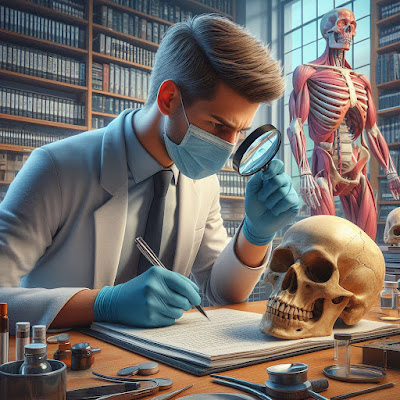Forensic medicine, often depicted in crime dramas and detective novels, holds a fascination for many due to its mysterious and captivating nature. However, beyond the realm of entertainment lies a field deeply rooted in science and dedicated to uncovering the truth behind criminal acts, identifying perpetrators, and seeking justice for victims. In this blog post, we'll delve into the intriguing world of forensic medicine, shedding light on its principles, practices, applications, and the pivotal role it plays in the criminal justice system.
 |
| Forensic Medicine |
Introduction: Decoding the Mysteries of Forensic Medicine
Forensic medicine, also known as forensic pathology or legal medicine, encompasses a multidisciplinary approach to investigating deaths, injuries, and other medical-legal issues within the context of the law. It involves the application of medical knowledge, scientific methods, and investigative techniques to gather evidence, analyze findings, and provide expert testimony in legal proceedings.
The Role of Forensic Pathologists
At the heart of forensic medicine are forensic pathologists, medical professionals trained to perform autopsies, examine evidence, and determine the cause and manner of death in cases involving suspicious or violent circumstances. Forensic pathologists work closely with law enforcement agencies, coroners, and medical examiners to conduct thorough investigations and provide critical insights into the circumstances surrounding deaths and injuries.
Principles and Practices of Forensic Medicine
Forensic medicine relies on several key principles and practices, including:
Evidence Collection and Preservation: Forensic investigators meticulously collect and preserve evidence from crime scenes, including biological samples, trace evidence, and physical artifacts, to maintain chain of custody and ensure admissibility in court.
Autopsy Examination: Autopsies, or post-mortem examinations, are conducted to determine the cause of death, identify injuries or diseases, and gather forensic evidence such as toxicology results, DNA samples, and injury patterns.
Forensic Toxicology: Forensic toxicologists analyze biological samples, such as blood, urine, and tissue, to detect the presence of drugs, alcohol, poisons, or other substances that may have contributed to a person's death or impairment.
Pattern Recognition: Forensic experts use pattern recognition techniques to analyze injuries, gunshot wounds, tool marks, and other physical evidence to reconstruct events, identify perpetrators, and corroborate witness testimony.
Applications of Forensic Medicine
Forensic medicine has diverse applications across various domains, including:
Criminal Investigations: Forensic evidence plays a crucial role in criminal investigations, providing insights into the circumstances of a crime, establishing timelines, and linking suspects to crime scenes through DNA analysis, fingerprinting, and other forensic techniques.
Mass Disaster Response: Forensic teams are deployed to mass disaster scenes, such as natural disasters, terrorist attacks, or transportation accidents, to identify victims, assist in recovery efforts, and provide closure to families.
Identification of Unknown Decedents: Forensic medicine aids in the identification of unknown decedents through dental records, fingerprints, DNA analysis, and other methods, helping to reunite families and bring closure to missing persons cases.
Expert Testimony: Forensic experts provide expert testimony in legal proceedings, presenting scientific evidence, interpreting findings, and assisting jurors and judges in understanding complex medical-legal issues.
Challenges and Ethical Considerations
Despite its importance, forensic medicine faces several challenges and ethical considerations, including:
Backlog of Cases: Forensic laboratories often face backlogs of cases due to limited resources, staffing shortages, and the increasing complexity of forensic analysis techniques, leading to delays in processing evidence and delivering justice.
Quality Control and Standards: Maintaining quality control and adherence to standards is crucial in forensic medicine to ensure the accuracy, reliability, and validity of forensic evidence and expert testimony presented in court.
Privacy and Confidentiality: Protecting the privacy and confidentiality of individuals involved in forensic investigations, including victims, suspects, and witnesses, is essential to uphold ethical principles and prevent unauthorized disclosure of sensitive information.
Professional Integrity: Forensic practitioners must uphold the highest standards of professional integrity, impartiality, and objectivity in their work, avoiding conflicts of interest, bias, or undue influence that may compromise the integrity of forensic examinations and conclusions.
The Future of Forensic Medicine
As technology continues to advance, the future of forensic medicine holds tremendous promise for innovation and improvement. Emerging technologies such as DNA sequencing, forensic imaging, and digital forensics are revolutionizing the field, enhancing the accuracy, efficiency, and scope of forensic investigations.
Conclusion: Unveiling Truth, Delivering Justice
In conclusion, forensic medicine stands as a pillar of the criminal justice system, dedicated to uncovering truth, delivering justice, and bringing closure to victims and their families. Through its rigorous scientific methods, meticulous attention to detail, and unwavering commitment to integrity, forensic medicine serves as a beacon of truth and accountability in the pursuit of justice.







